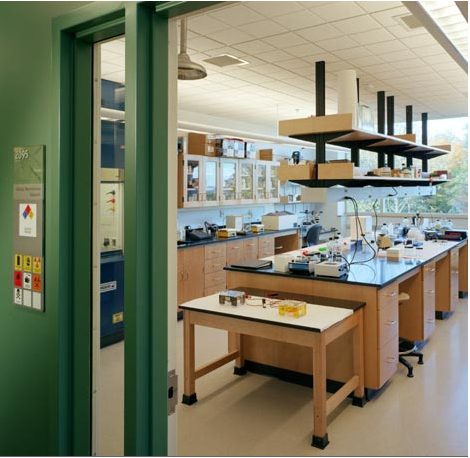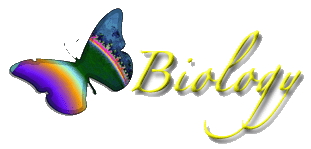Bioinformatics @Hamilton
Objective
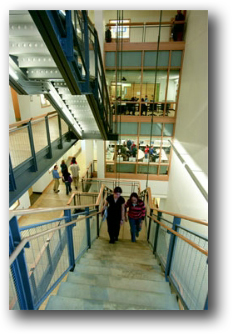
The objective of the Bioinformatics in Biology Education Group is to increase the information technology literacy of students in undergraduate biology classes through integration of bioinformatic technology in lecture, laboratories and assignments. With a grant support from NSF (Course, Curriculum, and Laboratory Improvement Award 2003-2008), the Biology faculty has developed or adopted more than 20 informatics-related teaching modules which are taught in more than 10 different courses. The expected outcome is a long-term commitment to information technology within biology curricula and a generation of students prepared to accept the challenges of pursuing careers in research, education, health or industry.
What is Bioinformatics
In short, bioinformatics is a subdiscipline of Biology which involves using computer programs to analyze biological datasets. Molecular evolution, genomics and genome functional annotations, phylogenomics, pharmagenomcis, proteomics, protein 3-D structure predictions and analyses, algorithm developments, statistic analyses, etc., can all be considered as bioinformatics.
Bioinformatics at Hamilton
At Hamilton we offer a bioinformatics curriculum strongly tied to our molecular biology core courses. Teaching modules and research projects related to bioinformatics, including, but not limited to, genome curation, gene predictions and functional annotations, phologenetic tree reconstructions, and microarray data analyses are our current emphases. Biology faculty is also aware of the fast-changing nature of bioinformatics and constantly revamps and redefines our curriculum to best serve our students.
Why Bioinformatics
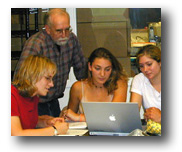
The scope of biological research is changing rapidly with the evolution of new information technologies. To be successful beyond undergraduate education, it is essential that students educated in the biology-based disciplines receive training and knowledge in the use of computer technology.
What Courses Contain Bioinformatics Modules
BIO 101 General Biology: Genetics and Evolution.
BIO 102 General Biology: Cells to Ecosystems.
BIO 115 Biology: Fundamentals and Frontiers.
BIO 200 Scientific Digital Imaging.
BIO 240 Plant Diversity.
BIO 248 Genes and Genomes.
BIO 336 Cell Biology.
BIO 346 Biochemistry.
BIO 357 Cellular Neurobiology.
BIO 443 Seminar in Bioinformatics.
Biology Computing Facility

Location in Science Center Room 2080
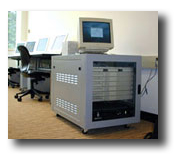
In addition to providing a dedicated teaching facility within the department, the Biology Computing Facility (BCF) provides open access to students, faculty and staff. The twelve Intel-processor equipped iMac Pro workstations and twelve MacBook Pro laptops are configured with general productivity tools for word processing, spreadsheet production, and presentation creation, along with some biology software. Our computing facility also includes a NSF-funded server, the Hamilton Bioinformatics Portal, which provides a web-based interface for faculty, staffs and students to access numerous bioinformatics software. BCF is open 24-7.
Bioinformatics Summer Workshops
Since summer 2007, Hamilton has held a series of bioinformatics workshops on campus. These workshops, led by Hamilton faculty or fellows from other institutions, provided hands-on sessions to students, faculty and colleagues from both Hamilton and community. Our goals are to broaden the breath of bioinformatics education, to exchange ideas on bioinformatics curricula with colleagues, to facilitate communication on bioinformatics within our community, and to enrich our summer research program. Past workshops and materials are listed below:
2007 Perl in Bioinformatics by Wei-Jen Chang and Alistair Campbell
2008 Computational Analysis of Complex Data Sets by Eric Ganko
2008 A Microarray Analysis Teaching Module by Megan Cole
2008 Fun with Words by Wei-Jen Chang
Current Collaboration
Paramecium Genome Annotation Project – with CNRS, France. http://paramecium.cgm.cnrs-gif.fr/
Undergraduate Research in Microbial Genome Annotation – with DOE Joint Genome Institute (JGI). http://www.jgi.doe.gov/education/genomeannotation.html
Members
Patrick D. Reynolds, P.I. |
preynold@hamilton.edu |
Wei-Jen Chang, Co-P.I. |
wchang@hamilton.edu |
Kenneth M. Bart, Co-P.I. |
kbart@hamilton.edu |
| Herman K. Lehman, Co-P.I. |
hlehman@hamilton.edu |
| Jinnie M. Garrett, Co-P.I. |
jgarrett@hamilton.edu |
Steve Young |
slyoung@hamilton.edu |
Past Interns
Pradeep Ravada |
pravada@hamilton.edu |
Matt Anderson |
matholamew@gmai.com |
Tianren (Molly) Sun |
mollysun323@gmail.com |
